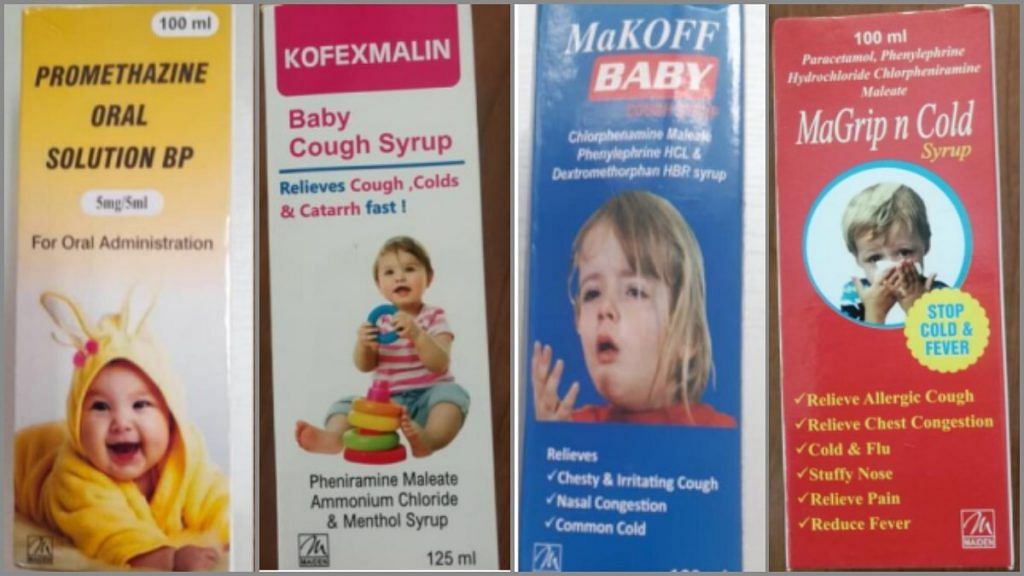New Delhi: Amid allegations that four medicines manufactured by a Haryana-based pharmaceutical firm could be linked to the deaths of 66 children in The Gambia, ThePrint has learnt that the World Health Organization (WHO) had informed India’s drug regulator about this last week, after which the Indian authorities launched a detailed investigation.
On Wednesday, the WHO issued an alert warning against the four cough and cold medicines manufactured by Sonepat-based Maiden Pharmaceuticals — Promethazine Oral Solution, Kofexmalin Baby Cough Syrup, Makoff Baby Cough, Syrup and Magrip N Cold Syrup. These were identified as “substandard products” allegedly containing two toxic compounds.
The WHO statement said it was important to remove these products from circulation,and requested “increased surveillance” — including of the informal/ unregulated market — in countries likely to be affected. It added that all batches of these products should be considered unsafe until they can be analysed by the relevant national regulatory authorities.
According to a source in the health ministry, the WHO had already alerted the Drugs Controller General of India (DGCI) on 29 September about a possible causal link between the drugs and the deaths.
After this, the Central Drugs Standard Control Organisation (CDSCO) — India’s regulatory body that deals with drugs, cosmetics, and pharmaceuticals — swung into action. It responded to the WHO within an hour and a half and took up the matter with the State Drugs Controller of Haryana, under whose jurisdiction the Sonepat based-company comes, the source said.
According to the health ministry source, a preliminary inquiry shows that Maiden Pharmaceuticals is a licensed manufacturer that holds permission to make these products, and that so far, the company has exported these products only to The Gambia.
It has also been reported that Maiden Pharmaceuticals doesn’t supply its drugs in India.
ThePrint tried to reach Maiden Pharmaceuticals via telephone. This report will be updated as and when a response is received.
Toxic compounds
The WHO statement issued Wednesday said that a laboratory analysis of samples of each of the four products “confirms that they contain unacceptable amounts of diethylene glycol and ethylene glycol as contaminants”.
“To date, these four products have been identified in The Gambia, but may have been distributed, through informal markets, to other countries or regions,” the statement said.
Ethylene glycol is an odourless, colourless, flammable, and viscous liquid that is used as a raw material in the manufacture of polyester fibers and for antifreeze formulations.
Diethylene glycol is also a colourless liquid with a sweetish taste, used in brake fluids — a type of hydraulic fluid used in brakes and clutches in automobiles — and as an industrial solvent.
Both compounds are toxic to humans when consumed, and can prove fatal.
According to the statement, the compounds’ toxic effects can include abdominal pain, vomiting, diarrhoea, inability to pass urine, headache, altered mental state, and acute kidney injury which may lead to death.
Also Read: 4 patented HIV, hepatitis & TB drugs now on govt price control list. Controversial ranitidine cut
‘WHO yet to share test certificates’
The WHO has identified the four medicines as substandard products. These are defined as products that fail to meet quality standards or specifications, and are, therefore, “out of specification”.
However, the health ministry source told ThePrint that only four out of 23 samples tested by the WHO were found to contain diethylene glycol or ethylene glycol. The source added that the WHO is yet to share the certificates for these tests with India.
“At the same time, the exact one-to-one causal relation of death has not yet been provided by the WHO, nor [has it shared] the details of labels or products [that would enable] the CDSCO to confirm the identity or source of the manufacturing of the products,” the source said.
The source said that the CDSCO has already launched an “urgent investigation” in conjunction with the state regulatory authorities.
“While all required steps will be taken in the matter, as a robust national regulatory authority, [the CDSCO has asked] the WHO to share the report [establishing a] causal relation to death with the medical products in question, photographs of labels/ products, etc. at the earliest,” the source said.
(Edited by Uttara Ramaswamy)
Also Read: 3 banned drug cocktails get all-clear from Modi govt but could have few takers in pharma sector
